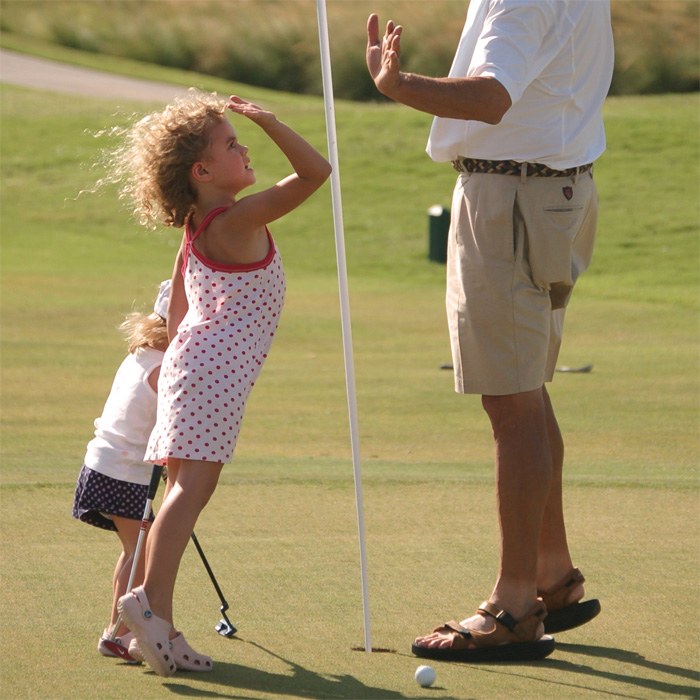Everyone has their own parenting style rooted in their personal values, beliefs, and history. You don’t have to change your parenting style when your young one takes an interest in golfing, but you may want to alter the way you approach certain areas to help your young golfer reach his or her full potential.
Playing professionals, sports psychologists, and teaching professionals have weighed in to give parents the best advice on how to help their aspiring junior player. Whether you sign-up for Mesa junior golf lessons from a coach or instructor or you register your son or daughter into an Arizona junior golf academy, it is important for you to understand how important your role is. You, your child, and your child’s coach form a trifecta, and you can strengthen or weaken each other based on how you work together.
Learning how to properly support your Arizona young golfer will increase your child’s confidence and self-esteem, which will help them in all areas of their life. Here’s are the steps essential for the success of your young player.

Be Supportive
Be your child’s biggest fan, no matter what the outcome and no matter how well your child played (or didn’t). Leave the coaching to the golf coach. As a parent, your role is vital. Your child looks to you for support. They want nothing more than to make you proud.
Offering empathy and a listening ear when your child doesn’t play as well as they would like is essential in the recovery process. Young athletes tend to be hard on themselves already; comparing themselves to other players, to themselves, and to their role models (i.e. professionals they see on TV and, yes, their parents!). Offer support by providing consistent backing, encouragement, and positive energy for your child to feed on. But let the experienced JGAA golf coach be the one to push, to challenge them mentally and physically, and to show them how they can strive to improve. It is the job of the coach to motivate players to be better in all areas of their game. Good coaches will do just this and will ask for nothing but the junior’s best while training. At times, this process is a difficult progression and your child will lean on you for positive support.
Don’t Push Your Own Dreams

Whose dream is it for your child to be a golfer, really? If it’s not your child’s, then forcing your child to play could be detrimental. Try to not force the game you may love onto a young man or woman if they do not share the same passion for the game that you have. Put simply, if your child isn’t motivated and is not interested in whatever they are doing, they will never become the best they can be and will eventually burn out. The love of the game of golf must come internally not externally. When this happens, great things can happen!! They will be excited to go to the course, practice, and they will be invested in their own improvement process.
Above all, golf should be fun! It could become more one day, but for right now, it should be something that your child enjoys doing. If it’s not fun, then going to the golf course will become a chore, and your child will never become better. If you aren’t sure how your child is feeling about golf, check in with them.
Allow Your Child the Gift of Failure

So many young athletes feel like they can’t fail. They might feel like they aren’t improving or don’t have natural talent if they aren’t accomplishing their goals fast enough, or they might feel like they are letting themselves down, their coaches down, or their parents down. But failure is a gift! Failure teaches all of us how to come back stronger than ever. It teaches us resiliency. It gives us strength. During Gilbert golf lessons and in the game, it teaches us how to improve so based on our past mistakes.
Failing is a critical part of life. Failing a job interview, getting your first “C” on a test in college, getting fired – these are almost like rites of passage. And these experiences teach us how to do better. They teach us that it’s OK to try and fail and to come back again. If you’re child is afraid of failure, they will be afraid to try new things, and trying new things is what leads to all of the amazing things!!! If – no, when – your child blows a two-shot lead on the back nine, let them cry, get frustrated, pout, mope and use excuses. Then, use that experience as a learning opportunity for them. Each time you fail your mind receives valuable information on how to do it better! Each and every failure is another stepping stone towards success for young golfers. To quote Michael Jordan, “the only reason I have succeeded more than anyone else is because I have failed more than they have.”
Focus on Process, Not Outcome
You can’t decide to start running and then complete a marathon the next day. Greatness takes time. Building skill takes time. If you become too focused on the outcome, you are going to try to take shortcuts through the building phase. Make sure that you are focused on the process of building skills and enjoying the game so that your child will be, too.
It takes at least 10 years of relentless, unparalleled, rigorous, purposeful, intense practice every day just to potentially be good enough to play professional golf. It can take three years for young golfers in Cave Creek just to learn how to practice properly. No matter how strict you are or how much your child works, you aren’t going to be able to sidestep this process. So learn to relax, and help your child relax, and enjoy the process of becoming better. Focus on the small steps and the things you have control over.
Focusing on improving the competitive mindset, posture, alignment, routine, drills that players work on with their coach, and balancing practice between putting, short game, long game, and on-course practice are all examples of things that are within our control. When young players focus on practicing properly and learn to focus on the controllable, the results are taken care of and improvement is easy!!
Embrace Competition

Golf should be fun, obviously, but competition takes enjoyment to new heights. Competition is what kids love! Learning how to persevere in high-pressure situations offers the ultimate high and when improvement happens in a tournament setting the love of the game is truly instilled. It is in this setting that young players learn how to improve their focus and their mental fortitude, which is just as important to the improvement process as improving their physical skills.
Hours on the driving range can become boring and routine over time. Competition helps to keep young players passionate about the game and offers players the chance to test their overall game, mentally and physically. If your young golfer doesn’t perform as well as they would like, use it as an opportunity to teach them how to deal with loss or perceived failures. If your golfer does well, the win will encourage them work even harder to improve.
Golf is fun, and as a parent, you can ensure that your young golfer keeps the enjoyment of the game as the focus while also learning how to become better at the game. You play a wonderful and powerful role as a parent and your child will improve and love the game more than you can ever imagine when you help them learn to enjoy the game.
Elite Golf Schools of Arizona is here to help! Please contact us if you have questions on how to improve your child’s experience with the game of golf. Good luck to you and your family on this wonderful and crazy venture to #achieveexcellence in this great game!
Published By:
Elite Golf Schools of Arizona
2401 S Lansing
Mesa, AZ 85209
Phone: 720-289-6196
Email: [email protected]
Website: elitegolfofaz.com
